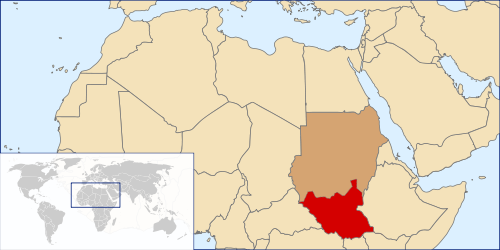ICT outlook for South Sudan still unclear
Most have heard of the political, economic, and social ramifications of an officially divided Sudan. But, what effect, if any, will southern independence have on ICT development?

Southern Sudan, bordered by Ethiopia, Kenya, Uganda, DRC, CAR. {By Mandavi, GFDL via Wikimedia Commons}
Last April, in a city profile on Khartoum‘s information communication technology progress, I speculated:
…a new hurdle could shift attention away from ICT yet again. Southern Sudan’s independence referendum in slated for January 2011.
Well, that day has finally arrived. Results won’t be in for some time, and, given a majority vote for independence, the south will not become sovereign for months. Still, the results of the election almost don’t matter for ICT – southern Sudan, notably Juba, is already separated from Khartoum in terms of ICT activity.
Politically and culturally the separation of the two areas (which perhaps never should have been one country) makes sense. However, from an ICT perspective, the split poses more challenges to the South than it does the North. North Sudan’s ICT scene will most likely remain less affected by southern independence, since much of the infrastructure, Arab investment ties, and whatever ICT policy that exist are located there. The question will be how much of the current policy, precedent, and practice the South chooses, or is able to inherit. Additionally, the logistics surrounding the establishment of sovereignty will understandably overshadow the government’s attention devoted to encouraging the adoption of technology.
In the long term, if political stability can persevere, greater cohesion and unity within each nation should spur ICT growth. Furthermore, neighboring nations (Sudan currently borders an astonishingly high eight other nations) have been encouraged to aid in South Sudan’s assumed transition.
Even if peace endures, minor logistics remain before South Sudan can reach its full growth potential for ICT:
- new ccTLD needed – the .sd country-level domain will presumably apply only to the North
- Sudan Internet Society is based in the North
- a national ICT policy will need to be created (the North could use a new one as well)
- oil revenue sharing and the division of North/South share of foreign debt will influence the financial side
- University of Khartoum leads the way in terms of setting precedents for infrastructure and training in Sudan – what school in the South can fill this void? Or, can Khartoum work with the South?
- Presumably, Sudatel will remain the major telecom operator in the country, but will others use this moment to enter the marketplace?
Web searches suggest that South Sudan has neither sought nor experienced much in the way of ICT projects (mainly due to the disruption of the war). The lack of information is frustrating:
- southern Sudan has reached out to investors and is setting up an ICT forum. This part of the country is ready to provide friendly legislation to ease the inflow of ICT investment.
- However, even in southern Sudan, a World Bank project failed after experiencing a lack of enthusiasm from within. http://www.un-gaid.org/News/tabid/864/mctl/ArticleView/ModuleId/2247/articleId/21358/Sudan-Is-ICT-all-its-cracked-up-to-be.aspx
- In 2006 South Sudan sought Rwanda as a source for ICT expertise. http://allafrica.com/stories/200610150117.html
- South Sudans President Salva Kiir has no official Facebook page, but over 267 people like an unofficial page. A Wikipedia community page is liked by over 500 individuals.
Again, South Sudan is in good geographic position: the nation borders North, East, and Central Africa. Neighboring Uganda is quite advanced in ICT for a nation of its size and the capital of Kampala is located not far from Juba. Juba, with an estimated population of 250,000 and once a transportation hub, is already home to extensions of Kenyan and Ugandan business. It will be this city that must lead the new country.












 Twitter
Twitter Facebook
Facebook Pinterest
Pinterest
from my outlook I really hope everything goes okay